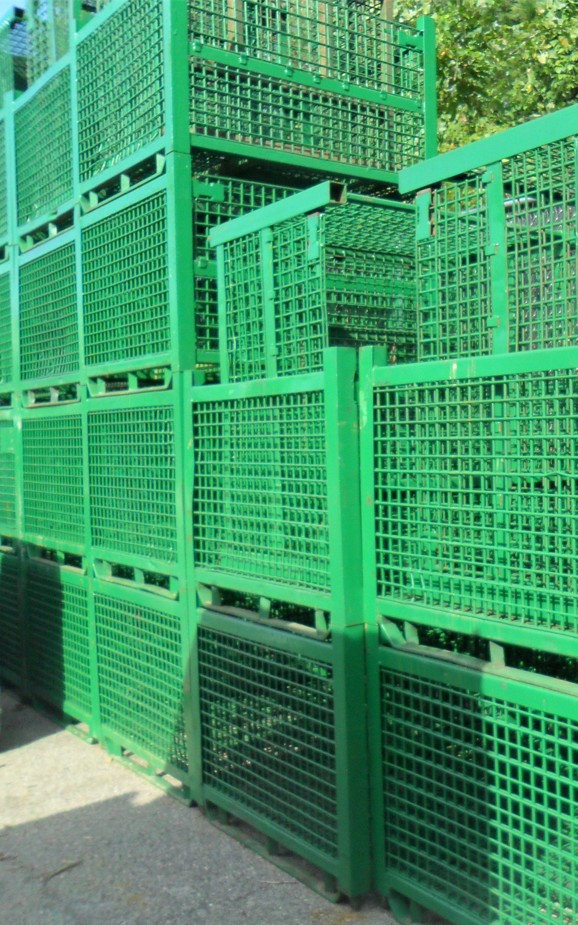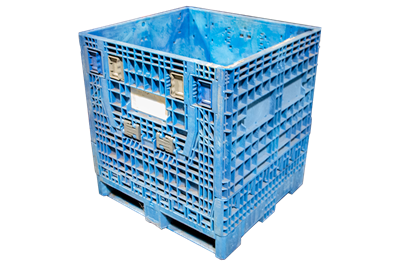Why Bulk Containers Are Vital for Lasting and Affordable Transportation
Mass containers play an important function in contemporary logistics. They help with the reliable activity of big quantities of products, thereby maximizing transport processes. This approach not just reduces costs yet additionally reduces environmental impact with reduced emissions and waste generation. As markets look for even more sustainable practices, the fostering of mass containers is becoming increasingly significant. What implications does this shift hold for future logistics and supply chain management?
The Advantages of Utilizing Bulk Containers in Logistics
Mass containers transform logistics by improving efficiency and sustainability. These containers permit the transportation of big amounts of items in a solitary trip, markedly decreasing the variety of journeys called for. This not only enhances operations yet additionally decreases labor expenses connected with handling, loading, and unloading. On top of that, bulk containers are created to enhance space usage within transport cars, ensuring that more items can be shipped simultaneously.
The standardization of mass containers also simplifies the logistics process. With consistent dimensions, they can be quickly piled and kept, leading to improved warehouse monitoring. Additionally, mass containers typically include long lasting products that shield contents from damage during transportation, therefore reducing product loss and raising total dependability. Because of this, businesses can experience improved supply chain performance, inevitably bring about enhanced earnings and consumer satisfaction. This combination of aspects makes mass containers a vital asset in modern-day logistics.
Environmental Influence: Decreasing Waste and Carbon Impact
As markets increasingly focus on sustainability, the adoption of mass containers has actually arised as a key technique for reducing waste and reducing carbon impacts. These containers reduce the usage of product packaging materials, such as boxes and plastic, therefore especially decreasing general waste generation. By settling deliveries, bulk containers improve transport efficiency, enabling for even more items to be carried per journey. This decrease in journeys directly correlates with reduced greenhouse gas exhausts, adding to a smaller carbon footprint.
Mass containers can frequently be recycled or reused, further reducing ecological influence. The resilience of these containers assurances they can stand up to numerous transport cycles, minimizing the need for single-use options. used collapsible bulk containers. By enhancing logistics and advertising reliable source usage, bulk containers not just sustain sustainable practices but additionally motivate sectors to align with global ecological objectives. Eventually, their execution reflects a commitment to environmental stewardship and liable source management
Price Savings: Just How Bulk Containers Lower Transport Expenses
While numerous business seek methods to enhance their bottom line, using mass containers offers a substantial possibility for lowering transport expenditures. Mass containers take full advantage of the volume of goods transferred, allowing organizations to deliver larger quantities at the same time. This performance lowers the variety of journeys needed, directly lowering fuel costs and decreasing labor costs related to loading and discharging.
Additionally, bulk containers frequently feature streamlined layouts that maximize area usage within transportation automobiles. This means less voids, bring about much more effective use available capability. Furthermore, the durability of mass containers can lower the risk of product damage during transportation, lowering losses and making certain that more products arrive undamaged.
Enhancing Supply Chain Efficiency With Bulk Storage Solutions
Mass storage space remedies play a vital function in improving supply chain efficiency by enhancing stock monitoring. By settling products right into fewer, bigger containers, services can significantly reduce taking care of costs associated with frequent transfers and handling. This streamlined technique enables far better tracking and management of supply, inevitably bring about enhanced operational performance.
Streamlined Inventory Administration
Efficient supply monitoring is important for enhancing supply chain operations, especially when companies take on bulk storage space remedies. These remedies make it possible for businesses to maintain greater supply degrees while reducing the regularity of replenishment. By settling materials right into bulk containers, companies can streamline their inventory procedures, lowering the intricacy connected with tracking multiple smaller sized bundles. This method helps with accurate supply counts and boosts projecting accuracy, enabling more educated decision-making. On top of that, mass storage options streamline warehouse company, making it less complicated to locate and accessibility products when needed. As a result, organizations can attain a much more efficient stock turnover rate, eventually improving general supply chain efficiency and minimizing the possibility of stockouts or overstock situations.

Decreased Handling Prices
The application of mass storage options not just streamlines stock monitoring but additionally considerably decreases taking care of costs across the supply chain. By settling products into bulk containers, companies minimize the requirement for regular handling and transfer in between various storage and transportation systems. This technique lowers labor prices connected with loading, discharging, and relocating smaller sized plans. Additionally, bulk storage decreases the frequency of deliveries, bring about lower transportation expenses and decreased gas usage. Therefore, services can enhance their logistics procedures, permitting for a more reliable allotment of resources. Eventually, lowered dealing with expenses add to boosted general supply chain performance, cultivating an atmosphere that sustains both sustainability and financial stability.

Versatility of Bulk Containers Throughout Various Industries
Lots of sectors have unique requirements for transportation and storage, bulk containers have actually arised as a functional remedy that fulfills a wide array of requirements. These containers, varying from huge containers to specialized containers, can suit varied products, consisting of powders, granules, and liquids. In the agricultural market, mass containers assist in the transport of grains and plant foods, while the food and drink market uses them for ingredients and finished products. The chemical market counts on bulk containers for securely transporting hazardous products, making certain conformity with safety and security guidelines. Furthermore, building firms take advantage of mass containers for moving accumulations and other products. Their versatility prolongs to different modes of transport, consisting of ships, trucks, and trains, improving logistical efficiency. This versatility not just simplifies procedures across different fields yet also advertises sustainability by minimizing packaging waste and maximizing area in transportation. As a result, mass containers play a crucial function in modern-day supply chain management.
Future Fads wholesale Container Use and Sustainability
The future of bulk container usage is increasingly formed by cutting-edge materials growth that improves sustainability. In addition, automation in logistics promises to improve operations, lowering waste and improving effectiveness. Embracing round economic climate methods will certainly further change how bulk containers are created, made use of, and recycled, cultivating a much more lasting transportation landscape.
Ingenious Materials Growth
As markets increasingly prioritize sustainability, cutting-edge materials growth in bulk containers becomes a considerable variable in enhancing green transportation services. Manufacturers and scientists are checking out naturally degradable plastics, recycled compounds, and light-weight steels to reduce environmental influence. These materials not only lessen waste but also enhance gas efficiency by reducing the general weight of containers. Furthermore, advancements in smart materials, which can adapt to varying conditions, improve the longevity and functionality of mass containers. The assimilation of these innovative products straightens with round economy concepts, promoting reuse and recycling. As the demand for sustainable practices grows, the development of such materials will certainly play an essential duty in forming the future of mass container usage in logistics and transport.
Automation in Logistics
Considerable advancements in automation are poised to change logistics and the usage of bulk containers, improving sustainability in transport. Automated systems, consisting of drones and autonomous vehicles, are streamlining the activity of mass containers, lowering the reliance on conventional fuel-powered transportation. These technologies maximize transmitting and filling processes, improving and lessening vacant miles fuel performance. Furthermore, automated inventory management systems boost tracking and tracking of bulk containers, making certain far better resource allowance and decreased waste. The integration of the Net of Things (IoT) permits real-time data evaluation, making it possible for positive decision-making that aligns with sustainability objectives. As automation continues to advance, it is expected to drive further innovations in mass container usage, eventually supporting even more sustainable logistics practices and reducing the environmental impact of transportation.
Round Economic Climate Practices
Advancements in automation are establishing the stage for an extra integrated approach to round economic situation practices in the domain name of mass container usage. As markets increasingly welcome sustainability, bulk containers are being made for longevity and reusability. This shift not just minimizes waste but likewise boosts resource effectiveness. Firms are adopting methods such as closed-loop systems, where made use of containers are collected, refurbished, and reintroduced right into the supply chain. In addition, clever modern technologies check here track container life process, facilitating far better monitoring and reducing ecological effect. The partnership in between producers, logistics companies, and end-users is crucial in establishing criteria for lasting container usage. used plastic containers. Future patterns suggest an expanding focus on products that are naturally degradable and recyclable, more reinforcing the circular economic situation's principles in mass transport

Frequently Asked Concerns
What Products Are Mass Containers Normally Made From?
Bulk containers are normally built from long lasting materials such as high-density polyethylene, light weight aluminum, steel, and cardboard. These products provide protection, versatility, and stamina, making them ideal for delivering various goods in various markets effectively.
How Do I Choose the Right Dimension Bulk Container?
Selecting the ideal size bulk container involves reviewing the quantity of products to be moved, considering handling equipment compatibility, and appraising storage space needs. Correct dimension assurances effectiveness in transport and reduces waste during delivery.
Are Bulk Containers Reusable or Recyclable?
Bulk containers are frequently reusable, designed for multiple journeys, improving sustainability. Numerous can also be recycled, relying on the products utilized. Selecting recyclable alternatives better minimizes and supports environmental objectives waste in transport methods.
What Safety Regulations Relate To Mass Container Transport?
Security guidelines for mass container transport consist of conformity with the Department of Transport standards, appropriate labeling of harmful products, architectural integrity assessments, and adherence to weight limits to ensure safe handling and protect against accidents during transit.
How Can Companies Change to Using Mass Containers Properly?
Businesses can alter to bulk containers by assessing existing logistics, training personnel on handling, spending in suitable tools, optimizing stock monitoring, and collaborating with suppliers to ensure compatibility and performance throughout the supply chain.
As industries significantly prioritize sustainability, the fostering of bulk containers has actually emerged as a key approach for decreasing waste and lowering carbon impacts. By consolidating materials right into mass containers, firms can streamline their stock procedures, lowering the complexity associated with tracking several smaller sized plans. As industries increasingly prioritize sustainability, cutting-edge products development in bulk containers emerges as a significant variable in improving environment-friendly transportation options. Automated systems, including drones and autonomous lorries, are improving the activity of bulk containers, minimizing the reliance on conventional fuel-powered transportation. Additionally, automated stock monitoring systems enhance tracking and surveillance of bulk containers, making certain much better source allocation and decreased waste.